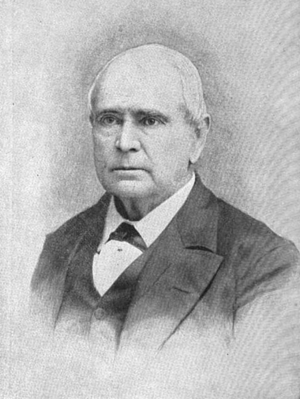James W. Deaderick facts for kids
Quick facts for kids
James W. Deaderick
|
|
|---|---|
 |
|
| Chief Justice of the Tennessee Supreme Court |
|
| In office 1876–1886 |
|
| Preceded by | A.O.P. Nicholson |
| Succeeded by | Peter Turney |
| Member of the Tennessee Senate for Washington, Sullivan, Carter and Johnson | |
| In office October 6, 1851 – October 2, 1853 |
|
| Preceded by | Abraham Tipton |
| Succeeded by | Godfrey C. Nave |
| Personal details | |
| Born | November 25, 1812 Jonesborough, Tennessee, U.S. |
| Died | October 8, 1890 (aged 77) Jonesborough, Tennessee |
| Resting place | Jonesborough City Cemetery Jonesborough, Tennessee |
| Political party | Whig Constitutional Union Democratic |
| Spouse | Adeline McDowell (m. 1832) |
| Relations | Joseph Anderson (uncle) Ephraim McDowell (father-in-law) Alexander O. Anderson (cousin) John Austin Moon (son-in-law) Cornelia Deaderick Glenn (niece) |
| Children | 10 |
| Education | East Tennessee College Centre College |
| Profession | Attorney |
James William Deaderick (November 25, 1812 – October 8, 1890) was an American lawyer. He became the chief judge of the Tennessee Supreme Court from 1876 to 1886. Before that, he was a judge on the same court, starting in 1870. He also served one term in the Tennessee Senate from 1851 to 1853. In 1860, he supported John Bell for president.
Contents
Early Life and Education
James Deaderick was born in Jonesborough, Tennessee. He was the youngest son of David and Margaret Deaderick. His father was a soldier who fought in the American Revolutionary War. James went to East Tennessee College and Centre College. However, he did not finish his studies at either school.
In 1833, James and his wife, Adeline, moved to Cheek's Crossroads in Jefferson County, Tennessee. He started a farm and a general store there. But his business did not do well, partly because of a financial crisis in 1837. In 1841, he briefly worked for the U.S. government, helping the Potawatomi tribe in Iowa.
After returning to Jonesborough, Deaderick began studying law. He learned from Judge Seth J.W. Lucky. Even though he thought about quitting, a young lawyer named T.A.R. Nelson encouraged him to continue. In 1844, he became a lawyer. He practiced law in Jonesborough until the Civil War began.
Political Career Before the War
In 1851, Deaderick was elected to the Tennessee Senate. He was a member of the Whig Party. As the head of the committee for "Internal Improvement," he strongly supported using state money to build railroads. He served only one term in the Senate.
In 1854, Deaderick ran for judge of Tennessee's first court district but lost. He also ran for state attorney general in 1859 but was not successful.
During the time leading up to the Civil War, Deaderick was against states leaving the United States. In the 1860 presidential election, he supported Constitutional Union candidate John Bell. Bell was against states leaving the Union but also against ending slavery.
In February 1861, Deaderick was chosen to be part of a meeting about whether Tennessee should leave the Union. However, voters decided not to hold that meeting. In June 1861, Deaderick attended a meeting in Greeneville for people who supported the Union. He helped create more moderate plans instead of very strong ones.
When Tennessee did leave the Union, Deaderick decided to support the Confederacy. He stayed out of public view during the war. Six of his sons fought for the Confederacy. After the war, in 1866, Deaderick had to move to Bristol because of threats. He then moved to Knoxville to continue working as a lawyer.
Serving on the Tennessee Supreme Court
After the Civil War, Tennessee created a new state constitution in 1870. This new constitution allowed former Confederates to vote again. In August 1870, judges were elected. James Deaderick was chosen as a judge for the Tennessee Supreme Court.
In 1876, after another judge passed away, Deaderick became the chief judge of the court. He ran for reelection in 1878 as a Democrat. He said his main goal was to understand and apply the law fairly, not to push political ideas. He was easily reelected.
Deaderick's legal opinions were usually short and did not always refer to previous court cases. He often made decisions based on what he felt was fair and just. During his time as chief judge, the court handled many different kinds of cases. These included issues about the state's money, problems from the war, family matters, and questions about fairness and equality.
One of the most important cases during his time was Lynn v. Polk in 1882. This case was about how Tennessee should handle its large state debt. The court decided that a law about paying the debt went against the state constitution. Deaderick was one of the two judges who disagreed with this decision.
Later Life and Family Connections
James Deaderick retired in 1886 and went back to his home in Jonesborough. He passed away in 1890 and was buried in the Jonesborough City Cemetery.
James and Adeline Deaderick had ten children. James Deaderick had many family connections:
- His uncle, Joseph Anderson, was one of Tennessee's first U.S. senators.
- His wife, Adeline, was the daughter of a famous doctor named Ephraim McDowell.
- Deaderick Street in Nashville was named after his older brother, Michael.
- His daughter, Adeline, married John A. Moon, who became a Congressman from Georgia.
- His niece, Cornelia Deaderick Glenn, married Robert Broadnax Glenn, who became the governor of North Carolina.
 | Jewel Prestage |
 | Ella Baker |
 | Fannie Lou Hamer |

